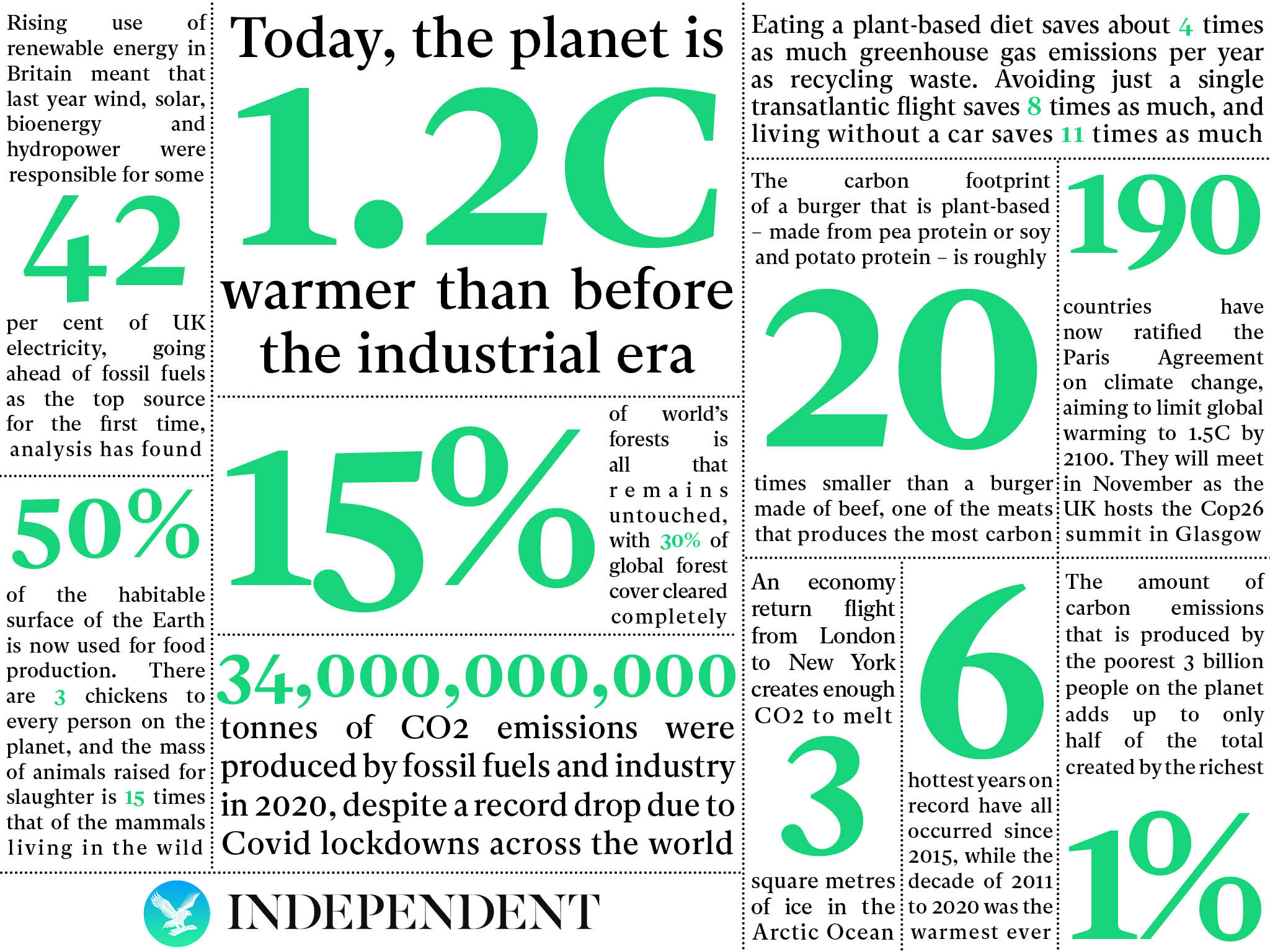Why 2021 will be a key year in the fight against the climate crisis
This year will be crucial for turning lofty pledges into tangible action, writes climate correspondent Daisy Dunne

The world entered 2021 faced with an alarming set of statistics. The six hottest years on record have all occurred since 2015, and 2021 is expected to continue the run. The last 14 years have seen the 14 lowest Arctic sea ice levels since satellite records began. CO2 levels in the atmosphere are currently around 415 parts per million (ppm), and are expected to breach a level that is 50 per cent higher than before the industrial era later this year.
“It’s iconic because it shows how much we have actually altered the composition of the atmosphere through human action,” Prof Richard Betts, who leads the Met Office’s annual CO2 forecast, told The Independent as the news broke.
Mean global temperatures are now around 1.2C above pre-industrial levels. The path to limiting global warming to 1.5C above pre-industrial levels, the aspirational target set by countries under the historic Paris Agreement, grows steeper year by year.
But there are glimmers of hope. In 2019, the former UK prime minister Theresa May set a legal target to reach net-zero emissions by 2050. Other large economies, including the EU, Japan and South Korea, made similar pledges in 2020.
China, the world’s largest emitter, shocked the world in October when it too announced intentions to reach “carbon neutrality” – at a slightly later date of 2060.
And last month Joe Biden replaced Donald Trump as US president. Biden signed an executive order to rejoin the Paris Agreement within hours of entering office, signalling a step-change in the country’s foreign policy. He also promised to commit the US, the world’s second-largest emitter, to reaching net-zero emissions by 2050.
An analysis produced near the end of 2020 by Climate Action Tracker (CAT), an independent research group, found that if all of these new net-zero pledges were met, it could hold global average temperatures in 2100 to as low as 2.1C above pre-industrial levels.
For a higher chance of keeping global warming to 1.5C, more nations will need to commit to net-zero emissions, and all countries will need to significantly increase their short-term ambition, scientists say.
This year will be crucial for turning pledges into tangible action. In November, the UK will host a key round of UN climate talks known as Cop26. It is the job of UK minister Alok Sharma, who has been appointed Cop president, to try to ensure that all countries come forward with more ambitious plans to tackle the climate crisis at the summit.
The UK got a taste of the scale of action that will be needed to reach net zero by 2050 upon the release of a report from the government’s independent climate advisers in December.
The report, from the Climate Change Committee, sets out a detailed path for how the country could reach net zero by 2050. The journey will involve sweeping changes across the entire British economy, from how we farm the land to the types of cars that we drive, according to the analysis. The government has until the summer to formally respond to the findings.
“[The CCC] highlighted that over half of the emissions cuts we need to reach net zero will derive partially or wholly from behaviour change,” Prof Dave Reay, director of the Edinburgh Centre for Carbon Innovation at the University Of Edinburgh, tells The Independent.
“Some of this is about overtly individual actions, such as changing diet, but most is about the successful combination of new technologies and policies.”
Research shows that, in general, individuals in high-income countries can lower their emissions by eating less meat and dairy and by cutting back on polluting forms of transport such as flying.
A study published in 2017 recommended several “high-impact” actions people in developed countries can take to reduce their emissions. Among these actions are living car-free, avoiding air travel and eating a plant-based diet. (The research also mentions having fewer children, but others have pointed out issues in the idea of ascribing a child’s emissions to their parents.)
The actions outlined “have much greater potential to reduce emissions than commonly promoted strategies like recycling ... or changing household light bulbs”, according to the study authors.
Their estimates suggest eating a plant-based diet is four times more effective at saving on greenhouse gas emissions on an annual basis than recycling. Meanwhile, avoiding just one transatlantic flight a year is eight times more effective at saving on emissions than recycling, and living car-free is 11 times more effective.
The research also notes that switching from plastic to canvas bags is less than 1 per cent as effective for the climate as a year without consuming meat.
While individual actions are important, it is key that they are coupled with more meaningful action from governments and businesses, says Prof Reay.
“That tackling climate change is either ‘all about government and business’ or ‘all about individual action’ has become a persistent, and false, dichotomy,” he says.
“Of course, it’s about both: government and businesses can’t – or won’t – act without individuals pushing them, and the best efforts of individuals are hobbled if government and business get in the way.”
Subscribe to Independent Premium to bookmark this article
Want to bookmark your favourite articles and stories to read or reference later? Start your Independent Premium subscription today.

Join our commenting forum
Join thought-provoking conversations, follow other Independent readers and see their replies